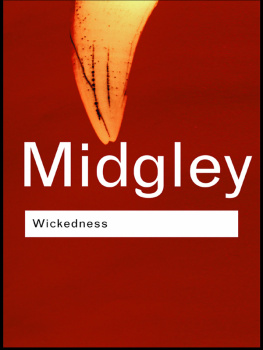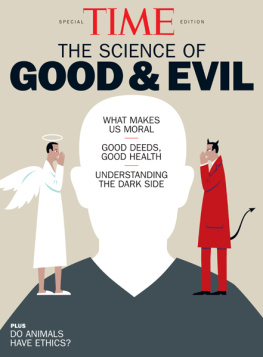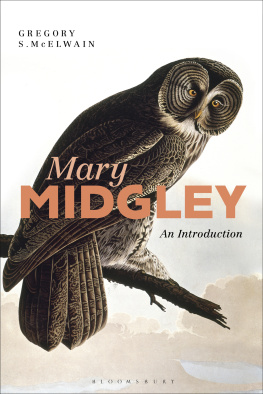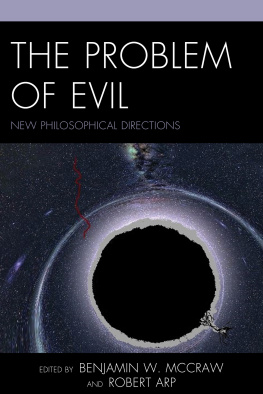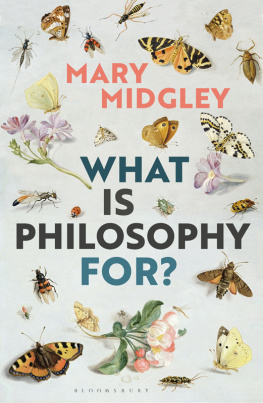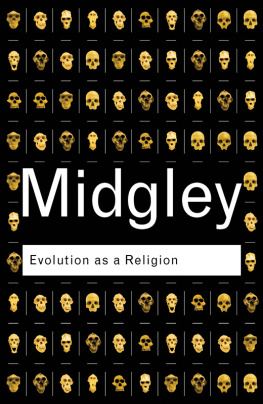Wickedness
Mary Midgley may be the most frightening philosopher in the country: the one before whom it is least pleasant to appear a fool.
The Guardian
I have now read the book twice, not because it is difficult (on the contrary it reads with the ease and elegance of Bertrand Russell), but because it is so stimulating.
Brian Masters, The Spectator
Mrs Midgley has set out to delineate not so much the nature as the sources of wickedness. Though she calls the book a philosophical essay, it is more a contribution to psychology. The book is clearly written, with a refreshing absence of technical jargon, and each chapter is followed by a useful summary of its principal arguments.
A. J. Ayer, The Listener
This edition published in the Taylor & Francis e-Library, 2001.
All rights reserved. No part of this book may be reprinted or reproduced or utilised in any form or by any electronic, mechanical, or other means, now known or hereafter invented, including photocopying and recording, or in any information storage or retrieval system, without permission in writing from the publishers.
PREFACE TO THE ROUTLEDGE CLASSICS EDITION
IS THERE SUCH A THING AS WICKEDNESS?
Wickedness means intentionally doing acts that are wrong. But can this ever happen?
During the past century, wickedness has been made to look somewhat mythical in our part of the world. Many doubts have been raised about whether such a phenomenon can actually occur at all. On the one hand, our increasing knowledge of the variety of cultures has made it seem obscure whether any act can be really and objectively wrong. On the other hand, various scientific systems that describe other forms of causation have undermined the idea of free-will. They have made it hard to see how our intentions can really be the source of our acts.
During that same century, however, the phenomenon we call wickedness has certainly not gone away. Nor has it become any easier to understand; indeed, it presses on us more than ever. For instance, if we think about the Nazi holocaust and other holo-caustsfor we had better not forget others such as those in Russia and Cambodia and genocides such as that in Rwandaquestions about the meaning of wickedness weigh heavily on us. They do so, too, when we hear of multiple killers, as in the recent story of Dr Harold Shipman, the Manchester GP who seems to have killed some 300 people while apparently remaining a normal member of society.
WHERE CAN WE SHELVE IT?
It does not seem easy to simplify these cases into any tidy form which we can pack away in pigeon-holes along with the more straightforward parts of our knowledge. It is hard to do this because we inevitably ask what it is like to be one of these peoplepeople who, for instance, devise death-camps.
From various scientific quarters we have been told that we should view these people fatalistically, as helpless mechanisms, merely inert tools or vehicles driven by their genes or by their cultures. That would put the issue on the scientific shelf. But if we did this we would have to view ourselves also as tools or vehicles of the same kind. And if we really, seriously believed thisinstead of just saying itit would scarcely be possible for us to get through the day. Life would become impossible, not because our dignity would be offended, but at a much deeper level, because that situation would make all our choices seem meaningless.
Does any other way of simplifying make better sense? Ought we perhapsas philosophers like Nietzsche and Sartre have suggestedsee these people as acting freely, indeed, but as being original moralists, authentically inventing new values which are in principle no less valid than those that are respected elsewhere?
This suggestion proposes an exciting, romantic idea of individual freedom; but again, if consistently followed through, it seems to make ordinary life impossible. If there can be no basis of agreement on these subjectsif each of us wanders alone in a moral vacuum, spinning values out of our own entrails like spiders, making them up somehow out of our own originality, taking nothing from anybody else and passing nothing on to othersthen we have ceased to be social creatures altogether. Most of the occupations that interest us must then evaporate, because they are essentially social. They depend on shared values. And we shall certainly then have no shared vocabulary in which to say what we think about actions such as devising death-camps.
PART-TIME SCEPTICISM
Of course these sceptical ideas do not have to be taken to their logical conclusions in this way. Usually they are not so taken. They are merely thrown out in extreme forms, used casually in bits and pieces where they happen to come in handy, and forgotten where they might make difficulties. In fact they are half-truths: one-sided proposals with a useful aspect which needs to be balanced by their other halves and then integrated into a wider framework.
At present, however, not much of this integration is being done. On the whole, these ideas wander about loose in various forms and combinations of immoralism, relativism, subjectivism and determinismforms which it is often quite difficult to understand and to distinguish. That is why, in this book, I have tried to sort them out and to ask how we can best understand and deal with them.
I have stressed that it is important to see that they are not just perverse aberrations, and to grasp the positive point of these ways of thinking. They arise largely out of two central strands of Enlightenment thought. On the one handmorallythese scepticisms have flowed from an admirable reaction against the gross abuses that long attended the practices of blame and punishment, and that still do so. On the other handin the realm of knowledgethey express a determination to make human conduct as intelligible scientifically as the rest of the physical world.
These are both noble aims, which is why the sceptical views in question have suggested many necessary reforms. But even the noblest aims, if they are pursued in isolation, uncritically, and without regard for other aspects of life, are liable to drag us off to paradoxical conclusions which we ought not to accept.
OUR AMBIVALENT NATURE
Originally, I wrote this book in order to deal with business that I knew was left over from my first book, Beast and Man. There, my aim was to stress the benign side of human nature. I wanted to say there that we should not be afraid of our animal nature. We should not deny our continuity with the other social animals out of a groundless fear of degradation. I pointed out that these animals are not embodied vices, not the grotesque stereotypes that our morality has often depicted. They really are our kin. They are like us in much of their emotional life; creatures who share with us many (though of course not all) of the qualities that we most value. So it is wrong to build human self-esteem solely on our difference from them, wrong to make our pride depend on finding a quality that completely differentiates us from the beasts. This kind of attempt to congratulate ourselves on being pure, autonomous intellects, immune from dependence on our earthly inheritance, is unrealistic and it distorts our system of values.

